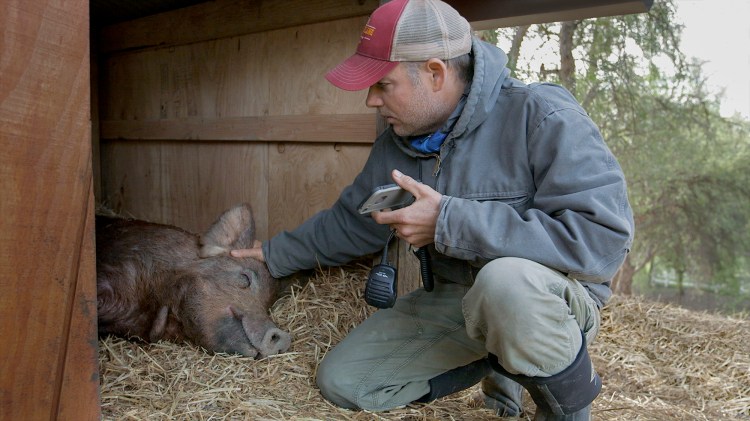This is how miracles happen. This is how great books and films happen. This is, biblically, how we all got here. It’s about a young couple seeking a sustainable Eden.
“Biggest Little Farm” begins with a rescued dog — an outlier, a lovable problem named Todd, who has been through three families, taken in and discarded. Our 21st-century Adam (John Chester, director and cinematographer) and his Eve (wife Molly, a chef and blogger) bring Todd home to their tiny Santa Monica, California, apartment. Todd becomes a major problem, a rug chewer and constant barker, whose howling gets them evicted.
And then, serendipitously, they find their Eden: Apricot Lane Farms, tucked away 40 miles from Los Angeles to the north. Apricot Lane more closely resembles Iraq than Eden. It’s filled with sickly bees; rocky, dead soil; coyotes; foxes; snakes; and every nocturnal creature known to man.
In their pillow talks, John and Molly always envisioned a self-contained paradise where they could raise what they eat and, hopefully, sell it.
Whoa! They encounter hordes of marauding creatures, fruit-killing snails, moles, gophers and murdering foxes who, they discover from a wandering Earth genius, must be their partners in creating their new age Eden.
In roughly 10 years they will live their dreams and nightmares, droughts and an incredible historic rash of fire.
This is a real story, a stunning journey by two bright, lovable, energetic people through every misfortune a mischievous deity can hurl at them. We learn right away that Mother Nature is not only not a beneficial “mother,” but a crabby, old, “get off my lawn” task master.
But John and Molly do not come unprepared. Dreamers they are, but master chef Molly has been blogging about farm-to-table food for a long time, and feels the time is right.
They have, we’re told, no money. But without revealing sources, we learn that John knows a lot of socially aware, successful Hollywood people who dream of doing the same thing. Not ready to host pigs, chickens and wallow in weeds, their benefactors choose to live vicariously with these pioneers. Investors flow in and by year two, eco-students from California colleges majoring in sustainable farming drift in, along with an ancient farmer and two Mexican farm hands whose families had worked this land for previous owners.
It’s not all Disney bluebirds and songs. Hardships arise, and there are many — unpredictable weather, the nocturnal wildlife marauders, an invasion of snails that eat the leaves the fruit depends on.
But the joys are many, as a rooster that befriends a sick mother pig (“Ugly Betty,” renamed Emily) and stays with her like a midwife through her illness.
It’s all gorgeously filmed here by the professional nature photographers John brought in to capture the stunning beauty that only our hungry summer-starved eyes can truly appreciate.
The lesson is clear. Despite the mega-ranches and farmers who are being kept alive by the gambler’s millions from the White House, hope springs eternal in the many Apricot Lane farms that dot our troubled landscapes. John and Molly are only two of the new age pioneers.
“Biggest Little Farm” in faraway hilltop Los Angeles seems to have been made for Mainers to see, understand and applaud. Go and join them.
J.P. Devine, of Waterville, is a former stage and screen actor.
Send questions/comments to the editors.



